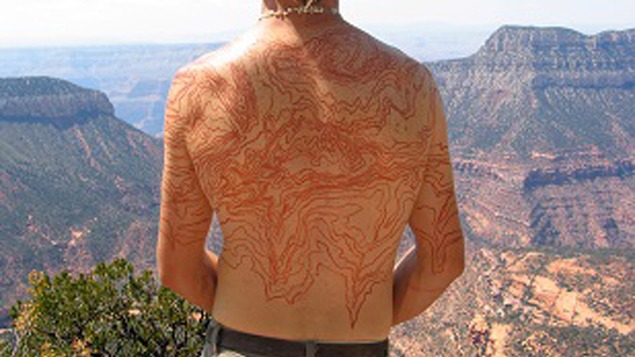Maps are not pictures of the land, but rather abstractions we use to understand where we are and how to move across the landscape. Maps can be as complicated and difficult to read as an abstract painting, but because we are surrounded by maps–from printed road maps bought at gas stations to digital ones on our smartphones–we are adept at reading them. Our familiarity with them means that we also sometimes forget that they are amazing objects.
In her ongoing series of mapping projects, Erika Osborne positions people as they gaze at landscapes such as the Grand Canyon. Then she paints lines from maps representing those scenes, or the contours of the land itself, on their skin. When we view Osborne’s photographs, she asks us to think about the differences and similarities between looking at a place, reading a map, and looking at a picture of a place. Osborne also paints maps on people while they are standing in front of large wall-mounted maps that convey different types of information, such as climate change or the spread of destructive insects and fires. She makes clear the connection between people, landscapes, navigational maps, and those maps used to take action in the landscape.
Osborne earned her Master of Fine Arts from the University of New Mexico, where she helped run the Land Arts of the American West program. She now teaches at West Virginia University in Morgantown, where she runs the Art and Environment and Place: Appalachia. By using the body as a canvas upon which to paint maps, Osborne helps us regain appreciation for how maps place us in the landscape. The result is a renewed appreciation for cartography, one of the oldest and most sophisticated graphic technologies invented by humans.
This archive exhibition includes research materials, maps, drawings, photographs, and objects from 2005 through 2010. The archive is in the collection of Nevada Museum of Art, Center for Art + Environment, Gift of Erika Osborne.
Support
John Ben Snow Memorial Trust and Metabolic Studio
